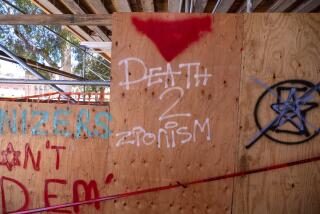S. Africa Offers Proposal Aimed at Salvaging U.N. Racism Forum
- Share via
DURBAN, South Africa — All references to Israel as an allegedly racist regime were at least temporarily stripped from draft documents at the World Conference Against Racism on Tuesday as event organizers struggled to salvage the gathering a day after the United States and Israel quit the proceedings.
Following days of bitter talks over the Middle East conflict, U.N. officials here stepped in with a proposal by South Africa. The officials hope the language will satisfy Arab delegates’ desire to criticize Israel’s treatment of Palestinians without labeling the Jewish state racist and offending other delegations opposed to singling out one country from among the 163 nations gathered here.
If a compromise cannot be reached, it is possible that there will be no mention of Israel or the Palestinians in the final documents, said Mary Robinson, the U.N. high commissioner for human rights and general secretary of the conference. That would mean that in its absence, the U.S. would have achieved what it failed to win while seated at the table, an unpleasant irony for many delegates who are furious that the U.S. team walked out Monday.
“I just wanted to say this conference--to us and millions and millions of people across the globe who have to deal with racism--is very important,” South African Foreign Minister Nkosazana Zuma told delegates Tuesday. “I think it is unfortunate the two countries left, and I think in the long run they will be the losers.”
Talk of compromise language and consensus is central to the success or failure of this gathering, the third World Conference Against Racism, Racial Discrimination, Xenophobia and Related Intolerance. With the U.S. and Israel gone, the depth of support for--and the credibility of--any final declaration by the conference has been called into question.
“The statement coming from this conference will not be obligatory. It is not a treaty,” said Barney Pityana, chairman of the South African Human Rights Commission, an independent oversight agency. “Its authority comes from the fact it is based on an international consensus.”
But even with the resuscitation effort underway, and despite organizers’ insistence that the conference was “back on course,” the events Tuesday seemed subdued and appeared at times to be off-track. Organizers acknowledged that the work was moving so slowly there was the chance they would run out of time before they completed their prime objectives: adoption of the formal declaration and a separate plan of action for dealing with racism.
The tedious process of having everyone agree on every word in the proposed documents was slogging along. Delegates gathered in two rooms, seated at long tables. Paragraphs of the proposed texts were projected on walls in front of them. The delegates debated the text phrase by phrase, line by line.
“If we do not rise to the challenge, we will not just have failed in reaching agreement at one conference,” Robinson said. “We will have failed those who need this conference most--the marginalized, the excluded, the hated.”
That said, Robinson and others defended the conference, saying it has succeeded in giving voice to the voiceless, bringing many people together and reaching consensus in many areas. She also said it is common at conferences for agreement to remain elusive until the very end.
The conference was dogged by controversy long before delegates set foot in this Indian Ocean port city. But the battle over the Middle East and efforts to label Israeli practices as racist became so heated that it overshadowed the broader agenda of fighting racism, seen as a root cause of poverty and oppression for people all over the world.
By the middle of the day Monday, after more than two days of negotiations, Arab delegates and Iran rejected a compromise proposal put forth by Norway and instead began to push for strong anti-Israeli language. Shortly thereafter, Secretary of State Colin L. Powell, who had not come to the gathering, ordered the mid-level U.S. delegation to leave. Its members caught a night flight to London.
Late Tuesday night, negotiations over how to address the Palestinian issue were being guided by South Africa, Norway and Namibia. The proposal they were working from was not made public, but Salman Harfy, the Palestinian Authority envoy to South Africa, said the group hoped to agree on “different language that would take into consideration all positions.” But he added, “The text must regard the Israeli actions against the Palestinian people as an occupying force, it must.”
In assessing the overall progress of the text-adoption committees, conference officials said Working Group I, which is focused on the final declaration, had adopted 12 paragraphs. Another nine were “within brackets,” meaning they had not been fully adopted, while 92 paragraphs were still under review.
Working Group II had adopted five paragraphs of the action plan, “one element of a sixth” and 13 paragraphs in brackets. Another 37 paragraphs were under review and 129 had not yet been considered.
The most difficult issues, such as the Middle East and slavery, were set aside or turned over to small groups to try to work out. Even plenary sessions had been canceled to give text committees a chance to work through the night.
More to Read
Sign up for Essential California
The most important California stories and recommendations in your inbox every morning.
You may occasionally receive promotional content from the Los Angeles Times.













